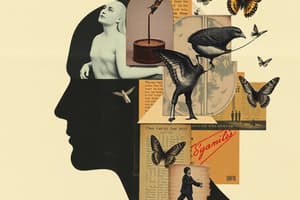Podcast
Questions and Answers
_____ is a systematic, relatively permanent change in behavior that occurs through experience.
_____ is a systematic, relatively permanent change in behavior that occurs through experience.
- Learning (correct)
- Maturation
- Erudition
- Edifying
_____ is a theory of learning that focuses solely on observable behaviors, discounting the importance of such mental activity as thinking, wishing, and hoping.
_____ is a theory of learning that focuses solely on observable behaviors, discounting the importance of such mental activity as thinking, wishing, and hoping.
- Humanism
- Psychoanalysis
- Conditioning
- Behaviorism (correct)
Your psychology assignment is to observe and list any behaviors of your relatives that indicate learning. Which of the following should be included on your list?
Your psychology assignment is to observe and list any behaviors of your relatives that indicate learning. Which of the following should be included on your list?
- Your mother forgets her keys. (correct)
- Your little brother whines whenever he wants something.
- Your sister bumps into a door when she has a high fever.
- Your father falls asleep watching TV.
Which of the following is true with regard to the principles of behaviorism?
Which of the following is true with regard to the principles of behaviorism?
Learning that occurs when an organism makes a connection between two events is called _____.
Learning that occurs when an organism makes a connection between two events is called _____.
In classical conditioning, organisms learn the association between two _____.
In classical conditioning, organisms learn the association between two _____.
Lightning is associated with thunder and regularly precedes it. Thus, when we see lightning, we often anticipate that we will hear thunder soon afterward. This is an example of _____.
Lightning is associated with thunder and regularly precedes it. Thus, when we see lightning, we often anticipate that we will hear thunder soon afterward. This is an example of _____.
Organisms learn about the consequences of behavior through _____.
Organisms learn about the consequences of behavior through _____.
Classical and operant conditioning involve learning through _____, whereas observational learning involves learning through _____.
Classical and operant conditioning involve learning through _____, whereas observational learning involves learning through _____.
Organisms learn the association between two stimuli through _____ whereas organisms learn the association between a behavior and a consequence through _____.
Organisms learn the association between two stimuli through _____ whereas organisms learn the association between a behavior and a consequence through _____.
Miranda is learning how to play tennis. For her first lesson, her instructor models serving and backhand returns while Miranda patiently watches. Miranda then tries to imitate the sequence of swings and motions made by her instructor. Which of the following concepts best describes how Miranda is learning to play tennis?
Miranda is learning how to play tennis. For her first lesson, her instructor models serving and backhand returns while Miranda patiently watches. Miranda then tries to imitate the sequence of swings and motions made by her instructor. Which of the following concepts best describes how Miranda is learning to play tennis?
The adage 'When in Rome, do as the Romans do' best reflects which of the following types of learning?
The adage 'When in Rome, do as the Romans do' best reflects which of the following types of learning?
_____ is a learning process in which a neutral stimulus becomes associated with an innately meaningful stimulus and acquires the capacity to elicit a similar response.
_____ is a learning process in which a neutral stimulus becomes associated with an innately meaningful stimulus and acquires the capacity to elicit a similar response.
Salivating at the presentation of food is an example of _____.
Salivating at the presentation of food is an example of _____.
Pavlov's dog automatically salivated to food because food is a(n) _____.
Pavlov's dog automatically salivated to food because food is a(n) _____.
Which of the following is the best example of an unconditioned response?
Which of the following is the best example of an unconditioned response?
Dr. Meyer is known for his difficult pop quizzes. Immediately before he springs a pop quiz on his students, he typically goes to the classroom door and closes it. Students soon learn to anticipate a pop quiz whenever Dr. Meyer closes the classroom door. Closing the door has become a(n) _____.
Dr. Meyer is known for his difficult pop quizzes. Immediately before he springs a pop quiz on his students, he typically goes to the classroom door and closes it. Students soon learn to anticipate a pop quiz whenever Dr. Meyer closes the classroom door. Closing the door has become a(n) _____.
A father takes his baby out for a walk. The baby reaches over to touch a pink flower and is stung by a bumblebee sitting on the petals. The next day, the baby's mother brings home some pink flowers. She removes a flower from the arrangement and takes it over for her baby to smell. The baby cries loudly as soon as she sees it. According to the principles of classical conditioning, what is the conditioned stimulus in this example?
A father takes his baby out for a walk. The baby reaches over to touch a pink flower and is stung by a bumblebee sitting on the petals. The next day, the baby's mother brings home some pink flowers. She removes a flower from the arrangement and takes it over for her baby to smell. The baby cries loudly as soon as she sees it. According to the principles of classical conditioning, what is the conditioned stimulus in this example?
You feel fine at the picnic until a spider very similar to the one that bit you last year and made you sick starts to walk onto your picnic blanket. This reaction is most likely a(n) _____.
You feel fine at the picnic until a spider very similar to the one that bit you last year and made you sick starts to walk onto your picnic blanket. This reaction is most likely a(n) _____.
In classical conditioning situations, the _____ connection is unlearned, but the _____ connection is learned.
In classical conditioning situations, the _____ connection is unlearned, but the _____ connection is learned.
Flashcards are hidden until you start studying
Study Notes
Learning and Behavior Theories
- Learning is a systematic, relatively permanent change in behavior through experience.
- Behaviorism is a theory focusing solely on observable behaviors, ignoring mental processes like thinking and wishing.
- Observational learning occurs when an organism makes a connection between two events.
Principles of Behaviorism
- Understanding behavior requires examining environmental factors.
- Learning principles are the same for both animals and humans.
- Key definitions:
- Unconditioned Stimulus (US): a stimulus that naturally elicits a response.
- Conditioned Response (CR): a learned response to a previously neutral stimulus.
Types of Learning
- Classical Conditioning: Learning that occurs when an organism associates two stimuli; for example, lightning associated with thunder.
- Operant Conditioning: Learning related to the consequences of behavior.
- Observational Learning: Learning through observing and imitating others' actions.
Key Concepts in Conditioning
- Classical conditioning involves the pairing of two stimuli (US with a Conditioned Stimulus - CS).
- Operant conditioning focuses on how rewards and punishments influence behavior.
- A learned response occurs when a neutral stimulus gains meaning through association with an unconditioned stimulus.
Examples of Conditioning
- Example of classical conditioning: The expectation of thunder following lightning.
- The conditioned stimulus in a situation where a baby cries after seeing a pink flower, previously associated with a bumblebee sting.
- Sneezing in response to sniffing pepper serves as an example of an unconditioned response.
Learning and Memory Constructs
- Latent learning involves learning that occurs without immediate reinforcement and may not be evident until needed.
- The adage "When in Rome, do as the Romans do" illustrates observational learning.
- Classical conditioning examples include Pavlov's dogs salivating at the sound of a bell when associated with food.
Classical Conditioning Mechanics
- The US-UR connection is natural and unlearned, while the CS-CR connection is acquired through learning.
- The significance of stimulus response patterns in anticipating events, such as a pop quiz indicated by a teacher closing the door.
Response to Past Experiences
- A conditioned response can manifest when experiencing stimuli similar to those associated with a past negative event.
- Emotional reactions such as heightened fear can occur upon encountering stimuli reminiscent of prior threats, even if those stimuli are not directly harmful.
Studying That Suits You
Use AI to generate personalized quizzes and flashcards to suit your learning preferences.




